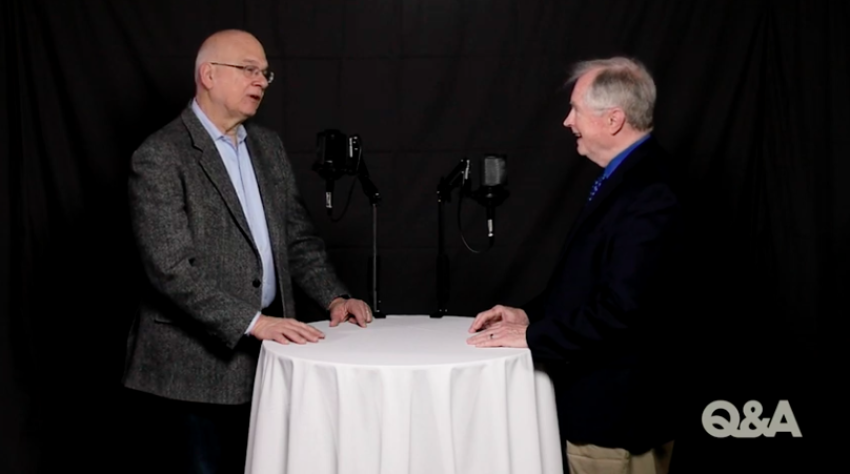Tim Keller, Don Carson identify 2 key objections to Christianity, how to respond

Theologians Don Carson and Tim Keller have weighed in on two key objections many college students have to Christianity and the Christian faith and shared how to best respond to such criticisms.
“It's probably easier to do university evangelism today than it was 20 years ago,” Carson, president and co-founder of The Gospel Coalition, said in a video posted on The Gospel Coalition's website.
“Partly because 20, 30, 40 years ago, a lot of university students were still fighting off the background of their own history in Judeo-Christian thought. They were still rebelling. Nowadays, they're so bone ignorant about classic Christianity that they don't know enough to rebel. You approach them courteously and they'll respond with a certain degree of courteous interest.”
“I used to get heckled,” the 73-year-old author added. “I’m much less likely to get heckled today.”
But the most “offensive” thing to university students today, according to Carson, is the “exclusive claims of Christ.”
“The question shows up in many different forms: How can you say that unless you're a Christian, you're going to Hell? Or, what about all the Hindus or Muslims or Buddhists or whatever?’” he explained. “So it's the exclusive claims of Christ that are perhaps the most offensive thing in the contemporary climate.”
To those who object to the inclusivity of Christ, Carson had this to say: “Surely you don't think that nobody goes to Hell, do you? Then what are the criteria for who goes to Heaven?”
“Suddenly you're into a serious conversation that traditional apologetics would be concerned about,” Carson said. “But you've got in it through a side door ... what holiness is and who God is and accountability to Him.”
Keller, author and co-founder of Redeemer City to City, agreed, adding that those who believe only “bad” people should go to Hell are being exclusive themselves.
“You're saying good people get in bad people get out,” he said. “I say anybody who asks for the mercy of Christ; the abusive person, the prostitute, the mafia man who kills people for a living, they can get in too. I would actually say that people who are humble enough to ask for a savior are in, and the people who are too proud are out.”
“Everybody's exclusive in some way. And I actually like, I feel like my exclusivity is a more inclusive exclusivity than yours,” he added.
Another common objection to Christianity is “anything that makes sin really offensive,” Carson said.
“What makes [sin] so ugly is precisely that it's an offense against God,” Carson said. “Whereas most people today in a university environment think of sin as sociologically defined. It's a cultural definition and has no eternal status, no fundamental repulsion. Unless you get clarity on the nature of sin, you can't get clarity on the nature of the cross. You can't get clarity on the nature of salvation unless you see what the problem is.”
When replying to such individuals, Keller recommended using an illustration: “Let's just say somebody does something illegal to you,” the pastor said. “It's not only a violation of the law, it's also a violation of you. And there's going to be anger because you're a person.”
The pastor used the illustration of a woman who put her only son through school at great cost to herself. In the end, she said to him, “I want you to always work hard and care for the poor once you come into your career.”
“So he comes out and he goes into his career and he works hard and he cares for the poor, but he never calls her. He never acknowledges anything,” Keller continued. “He just ignores her.”
“And then you ask the person, ‘What do you think about that? After all, that person is right and he's being very moral.’ The person who I'm talking to would say, ‘But he owes her his whole life, and the relationship has got to be there,’ or, ‘Even though he's a nice guy and he's a moral guy, he's actually still in a sense sinning.’”
“I think with illustrations like that, people begin to say, ‘Oh, if there is a God, then sin would have to be an offense against Him because He keeps us alive every second. We owe Him everything,’” Keller explained. “I think that's also a key objection of a lot of skeptical people. And I think that's a great way to answer.”
In a previous interview with The Christian Post, Carson spoke to the “strengths” of the millennial generation.
“I taught seminary for about 45 years, and so I've seen waves of students come through with different attitudes,” he said. “Fifteen years ago, the emergent church crowd went through. They were really arrogant. They were of the sword: ‘Move over and we'll show you how it's done.’ Almost none of them is left today.”
“The millennial generation that is still going through has been my favorite generation,” Carson continued. “Millennials are loyal. Millennials want to be mentored. They want somebody to show them that although they're hesitant to buy into historic doctrines and creeds and stuff, if they can be shown there's no one more loyal.”
The theologian revealed a great number of his millennial students come to him “asking how they can become missionaries in the Muslim world or how to plant cross-cultural churches in a multiethnic area of town."
“This is a great bunch coming through,” he stressed. “Are they sometimes too dependent on feelings? Yeah, they are. But the alternative can be just as bad, so dependent on logic and consistency that they're not broken by anybody. They're not compassionate. They don't know how to give anybody a hug. Every generation has certain characteristics, strengths, and weaknesses. But I like millennials.”



























